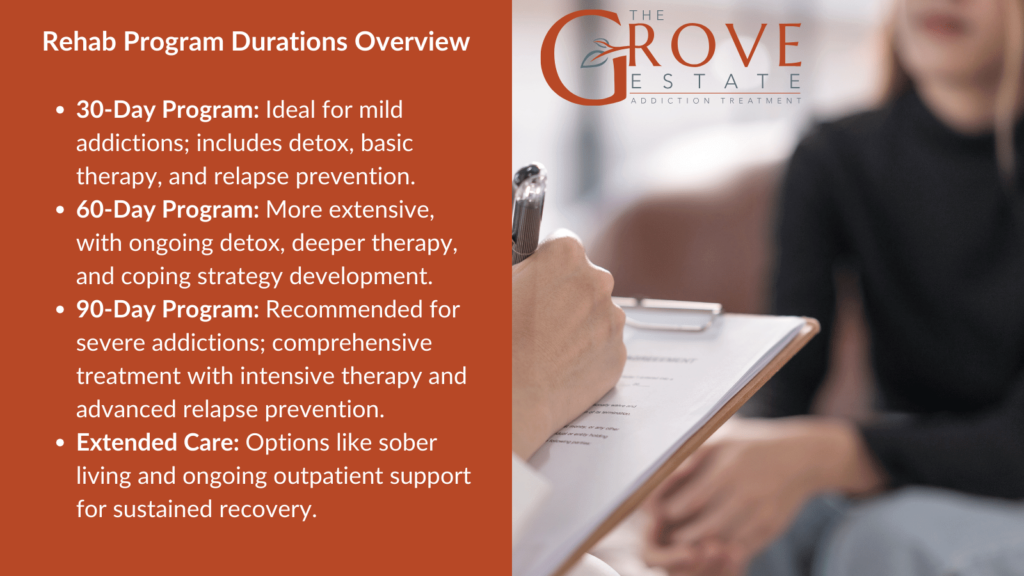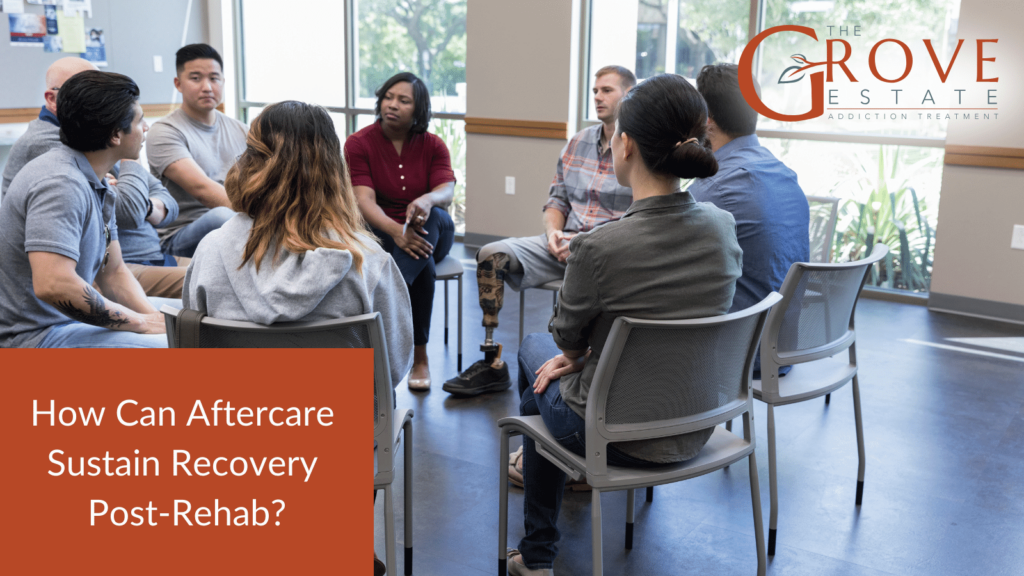Seeking treatment for addiction is a monumental step towards recovery, but one of the most common questions that individuals and their loved ones have is, “How long does drug and alcohol rehab take?” The length of stay in rehabilitation programs can vary widely depending on several factors including the severity of the addiction, the type of substance abused, and the individual’s personal health and circumstances.
According to the National Institute on Drug Abuse, the recommended minimum length of treatment for most individuals is approximately 90 days of continuous care. This duration has been shown to significantly improve outcomes and reduce the risk of relapse. There are various factors that influence the duration of stay in rehab as well as different types of treatment programs available that can cover a diverse range of addictions.

What Determines the Length of Rehab?
The duration of a drug and alcohol rehabilitation program is influenced by a myriad of factors, each playing a crucial role in tailoring treatment to an individual’s specific needs. Understanding these determinants can help patients and their families set realistic expectations and make informed decisions regarding treatment options.
An initial assessment will be conducted upon entry into rehab. This is pivotal in determining the length of stay. This comprehensive evaluation covers the patient’s medical history, substance use history, mental health status, and social circumstances. The goal is to identify any co-occurring disorders, such as depression or anxiety, which often accompany addiction and require integrated treatment. The complexity of the individual’s medical and psychological needs can significantly influence the duration of their rehab program. Types of Substance Abuse
Additionally, there are various types of treatment programs, each with its typical duration. Options include:
- Short-term residential treatment: Typically lasts 28 to 30 days, providing intense support in a controlled environment.
- Long-term residential treatment: Can extend from 60 days to over a year and is suitable for individuals with severe or prolonged addictions.
- Outpatient programs: These vary widely in length and intensity, allowing patients to maintain daily responsibilities while attending scheduled treatment sessions.
- Partial hospitalization programs (PHPs): Designed for individuals who require intensive care but can still engage in some everyday activities.
The severity and duration of a person’s substance abuse directly influence the length of necessary rehabilitation. Severe addictions often require longer stays due to the physical and psychological depth of dependence. A longer duration allows for:
- A more gradual detoxification process.
- Essential therapeutic interventions.
- Time for new habits to form, which are vital for long-term recovery.
By considering the personal needs, the type of program, and the severity of addiction, treatment professionals can better design a recovery path that offers the best chance for sustained sobriety.
What are the Benefits of Long-Term Rehab Programs?
Long-term rehab programs, typically extending 90 days or longer, offer numerous advantages for individuals struggling with substance abuse. These programs provide an extensive period of support, allowing patients to fully engage in the recovery process with a comprehensive focus that goes far beyond the initial detox. Here are some key benefits of long-term rehab programs:
Comprehensive Focus Beyond Detox
Long-term rehab extends past the detox phase, addressing deeper psychological triggers and reinforcing coping strategies to prevent relapse. This prolonged engagement allows for a more thorough exploration and understanding of personal triggers.
Addressing Mental Health Issues
These programs are well-suited for treating individuals with co-occurring mental health conditions alongside their addiction. The integrated treatment approach ensures that both the mental health issues and the addiction are treated simultaneously, which is essential for the overall recovery and mental well-being of the patient.
Strategies for Repairing Relationships
Addiction often harms relationships, but long-term rehab includes therapy sessions that involve family and loved ones. This process helps everyone involved understand the impact of addiction, resolves conflicts, and rebuilds trust, providing a supportive environment essential for recovery.
Developing Better Life Skills
Rehab centers provide education and training in crucial life skills, including financial management, job readiness, stress management, and healthy lifestyle choices. These skills are vital for maintaining sobriety and building a productive, stable life post-rehab.

How Long Do Common Rehab Programs Last?
Rehabilitation programs vary widely in duration to meet different needs and recovery goals. The length of stay in each program is typically based on the severity of the addiction, the specific substances involved, and the individual’s mental health and medical history. Here is an overview of the common durations for rehab programs and what they typically entail:
30-Day Program Overview
A 30-day program is often seen as a preliminary treatment option. It provides a solid foundation for detox and initial stabilization, offering intensive therapy and support to kickstart the recovery process. This timeframe is usually recommended for those with a mild addiction or as a “trial” period for individuals and their families to assess the effectiveness of therapy before committing to longer-term options. It includes:
- Structured detoxification process
- Introduction to group and individual therapy
- Basic relapse prevention strategies
60-Day Program Overview
A 60-day rehab program allows for a more extensive treatment than the 30-day option, giving more time to work on underlying issues related to the addiction. It includes:
- Continued detox and withdrawal management
- Deeper psychological evaluations and therapy sessions
- Enhanced focus on developing coping mechanisms
- Initial steps towards reintegrating into daily life
90-Day Program Overview
The 90-day, or three-month, program is recommended for those with moderate to severe addictions and is considered the standard duration for effective treatment. This program length allows for:
- Comprehensive detox and medical treatment
- Intensive therapy sessions to address deep-seated issues
- Development of extensive relapse prevention strategies
- Preparation for return to community living with ongoing support
Extended Care Options
For those who need additional support beyond the initial 90 days, extended care options are available. These may include sober living homes, ongoing outpatient treatment, and continuous care groups. Extended care is designed to provide a safe and supportive environment to transition from intensive rehab to independent living while maintaining sobriety. This stage is crucial for individuals at high risk of relapse or those who have experienced multiple relapses in the past.
How Do Inpatient and Outpatient Rehab Lengths Compare?
The typical lengths of inpatient programs are 30-90 days depending on the severity of the addiction. In contrast, outpatient rehab programs vary significantly in duration, largely depending on the specific needs and progress of the individual. Unlike inpatient programs, which have more defined time frames, outpatient treatment offers a range of durations tailored to accommodate different levels of addiction severity and personal schedules.
- Short-term Outpatient: These programs may last anywhere from one to three months and are suitable for individuals with mild to moderate addiction, focusing on initial recovery and relapse prevention strategies.
- Intensive Outpatient (IOP): For more severe cases or those requiring ongoing support, outpatient treatment can extend beyond three months, sometimes lasting up to a year or more. This long-term approach allows for the treatment of deeper-rooted issues and the development of robust coping strategies.
- Ongoing Maintenance: Some individuals continue to participate in weekly group sessions or individual counseling as part of ongoing maintenance to reinforce their recovery and prevent relapse.
Recovery is a lifelong commitment, and while both inpatient and outpatient programs have defined durations, consistent aftercare is important for maintaining sobriety and preventing relapse.

How Much of Rehab Costs Will Insurance Cover?
Insurance coverage for rehabilitation services can vary widely depending on the provider, the specific insurance plan, and the regulations of the state where the policy was issued. Most insurance plans, especially those compliant with the Affordable Care Act (ACA), cover at least a portion of addiction treatment, including detox, inpatient, and outpatient services. However, the extent of coverage can differ:
- Type of Plan: Private insurance, Medicare, and Medicaid may have different coverage rules and limitations.
- In-Network vs. Out-of-Network: Coverage levels may vary significantly between in-network and out-of-network treatment centers. In-network providers generally offer more substantial coverage.
- Pre-authorization Requirements: Some plans require pre-authorization for treatment services, which can affect the speed and ease of accessing rehab.
The length of the treatment program also impacts how much insurance will cover. Longer programs will be more expensive. Here’s how coverage typically works with program length:
- Short-Term Programs: These are more likely to be fully covered due to their lower overall costs.
- Long-Term Programs: Insurance may cover a significant portion of the beginning of the treatment, but some long-term costs might exceed policy limits, depending on the terms set out by the insurance provider.
- Extended Care and Aftercare: Coverage for these services can be limited, so it’s important to verify what support is available for ongoing maintenance and relapse prevention.
How to Start Your Journey and Choose The Proper Duration In Rehab?
Starting your recovery journey begins with a few key steps that set the foundation for successful rehabilitation:
- Professional Assessment: Consult a healthcare professional to evaluate your specific needs related to substance use and any co-occurring disorders. This step determines the severity of your addiction and helps tailor the treatment plan.
- Explore Treatment Options: Research different rehab programs to understand their offerings, length, and whether they align with your assessed needs.
- Consider Program Duration: Based on the professional assessment, choose a program duration—whether short-term (30 days), medium-term (60 days), or long-term (90 days or more)—that best suits the depth of treatment required for your recovery.
- Take Action: Initiate contact with selected rehab facilities, inquire about coverage with your insurance, and arrange for admission.

How Can Aftercare Sustain Recovery Post-Rehab?
Aftercare provides continuous support after the completion of an inpatient or outpatient program. It’s important because the transition back to everyday life can be challenging. Aftercare programs help individuals navigate this transition by offering ongoing therapy, support groups, and resources to cope with potential triggers and stressors.
Common Aftercare Programs and Support
- Support Groups: Programs like Alcoholics Anonymous (AA) or Narcotics Anonymous (NA) offer peer support and are crucial for many in maintaining their sobriety.
- Therapy: Ongoing counseling, whether individual or group, helps address new challenges and maintain mental health.
- Sober Living Homes: These provide a supportive, substance-free environment for people transitioning out of rehab.
- Educational and Employment Assistance: Some programs offer resources to help individuals rebuild their careers and educational paths, which is key to creating a stable life.
Aftercare is not just a phase, it’s a fundamental part of the journey that reinforces the daily commitment to a sober and healthy life. The journey to recovery doesn’t end upon completing a structured program; it requires ongoing dedication to aftercare strategies that support a sustained, healthy lifestyle free from substance dependence.
What is the rehab phase of recovery?
The rehab phase of recovery involves structured treatment programs aimed at helping individuals overcome addiction. This phase typically includes medical detox, therapy, counseling, and support groups, designed to address both the physical and psychological aspects of addiction. It’s a critical step in establishing a foundation for long-term sobriety.
Is rehab always successful?
Rehab is not always successful for everyone on the first try. Success depends on many factors, including the individual’s level of commitment, the appropriateness of the treatment plan, the quality of the rehab program, and ongoing support. Relapse can be part of the journey, but each attempt at recovery can be a step towards sustained sobriety.
What are the 4 stages of recovery?
The four stages of recovery are typically identified as:
1) Treatment initiation, where the individual recognizes the need for help and starts a treatment program;
2) Early abstinence, focusing on coping with withdrawal and avoiding relapse;
3) Maintaining abstinence, after approximately 90 days of continuous sobriety;
4) Advanced recovery, where the focus shifts to building a fulfilling, substance-free life.
How long does the recovery stage last?
The recovery stage, or maintaining abstinence, is a lifelong process. After initial treatment, this stage involves continuously managing the condition through ongoing support, personal development, and relapse prevention strategies. The intensity of necessary support may decrease over time, but the commitment to recovery is lifelong.
How does the cost of rehab relate to its duration?
The cost of rehab is closely related to the duration of the program. Longer programs often involve more comprehensive care, including extensive medical supervision, various therapy sessions, and extended stays in treatment facilities, which can substantially increase the overall cost. According to Healthline, the financial aspect of rehabilitation is significant, as the length of the program directly affects the total expense due to the accumulation of daily or monthly charges.
In discussing the economic implications of different program lengths, it’s insightful to consider how various factors contribute to the rehab cost. This consideration helps in planning and preparing for the type of program suitable for an individual’s specific needs and recovery path. Additionally, components such as group counseling play a pivotal role in both short and long-term rehab programs, enhancing the patient’s ability to develop coping strategies and maintain long-term sobriety. The integration of such therapeutic elements is crucial for effective addiction treatment and is reflected in the program’s cost and duration.

Share This Post



